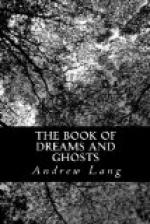The reader can now take his choice among versions of Sir George Villiers’ ghost. He must remember that, in 1642, Sir Henry Wotton “spent some inquiry whether the duke had any ominous presagement before his end,” but found no evidence. Sir Henry told Izaak Walton a story of a dream of an ancestor of his own, whereby some robbers of the University chest at Oxford were brought to justice. Anthony Wood consulted the records of the year mentioned, and found no trace of any such robbery. We now approach a yet more famous ghost than Sir George’s. This is Lord Lyttelton’s. The ghost had a purpose, to warn that bad man of his death, but nobody knows whose ghost she was!
LORD LYTTELTON’S GHOST
“Sir,” said Dr. Johnson, “it is the most extraordinary thing that has happened in my day.” The doctor’s day included the rising of 1745 and of the Wesleyans, the seizure of Canada, the Seven Years’ War, the American Rebellion, the Cock Lane ghost, and other singular occurrences, but “the most extraordinary thing” was—Lord Lyttelton’s ghost! Famous as is that spectre, nobody knows what it was, nor even whether there was any spectre at all.
Thomas, Lord Lyttelton, was born in 1744. In 1768 he entered the House of Commons. In 1769 he was unseated for bribery. He then vanishes from public view, probably he was playing the prodigal at home and abroad, till February, 1772, when he returned to his father’s house, and married. He then went abroad (with a barmaid) till 1773, when his father died. In January, 1774, he took his seat in the House of Lords. In November, 1779, Lyttelton went into Opposition. On Thursday, 25th November, he denounced Government in a magnificent speech. As to a sinecure which he held, he said, “Perhaps I shall not keep it long!”
Something had Happened!
On the night before his speech, that of Wednesday, 24th November, Lyttelton had seen the ghost, and had been told that he would die in three days. He mentioned this to Rowan Hamilton on the Friday. {129a} On the same day, or on Friday, he mentioned it to Captain Ascough, who told a lady, who told Mrs. Thrale. {129b} On the Friday he went to Epsom with friends, and mentioned the ghost to them, among others to Mr. Fortescue. {129c} About midnight on 28th November, Lord Lyttelton died suddenly in bed, his valet having left him for a moment to fetch a spoon for stirring his medicine. The cause of death was not stated; there was no inquest.
This, literally, is all that is known about Lord Lyttelton’s ghost. It is variously described as: (1) “a young woman and a robin” (Horace Walpole); (2) “a spirit” (Captain Ascough); (3) a bird in a dream, “which changed into a woman in white” (Lord Westcote’s narrative of 13th February, 1780, collected from Lord Lyttelton’s guests and servants); (4) “a bird turning into a woman” (Mrs. Delany, 9th December, 1779); (5) a dream of a bird, followed by a woman, Mrs. Amphlett, in white (Pitt Place archives after 1789); (6) “a fluttering noise, as of a bird, followed by the apparition of a woman who had committed suicide after being seduced by Lyttelton” (Lady Lyttelton, 1828); (7) a bird “which vanished when a female spirit in white raiment presented herself” (Scots Magazine, November-December, 1779).




